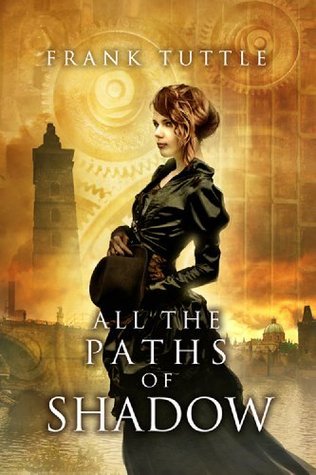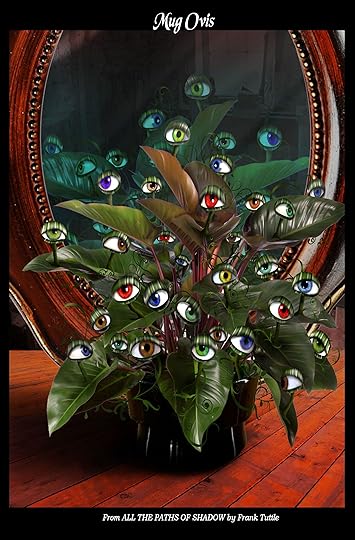What do you think?
Rate this book


484 pages, Paperback
First published September 13, 2011

Meralda glared. He didn't tell because he doesn't trust, she thought. And he doesn't trust, said a voice within her, because I'm a woman.
Meralda nodded, her jaw clamped too tight to speak. They mean to kill a great many people as Yvin gives his speech, she thought. The Hang delegation among them. Ruin the Accords, infuriate the Hang, leave the Realms divided and weak. And all of it blamed squarely on her. On the female Tirlish mage, who had no business ever donning the robes in the first place.
As she spread out her coat on the floor, another peal of thunder rang out, so loud and lingering Meralda wondered if it had struck the Tower. Park lore claimed such a thing had never happened, and immediately Meralda wondered if this, too, was another indication that her shadow latch had damaged some ancient Tower spellwork.
"Nonsense," she said aloud, as the echoes of the thunder clap died. "I can't be blamed for everything."
"No. But you are Meralda Ovis. You enchanted Mug to life when you were thirteen. You entered college that same year. [The hell did Dongchen know about this, anyway? He's only been in the country for a couple of weeks, much less had time to learn Meralda's life story!] You alone, of all Tirlin's mages, found the Tower's secret. We believe in you, Mage Ovis. Now you must only find a belief in yourself."
A few passers-by recognized Meralda. The sorceress, both the first woman and the youngest mage to ever occupy the seat of Thaumaturge in the long history of Tirlin, had briefly been the subject of notoriety in the papers.





Shingvere gently laid the latch across Fromarch’s knees and snatched his hand away. “This is your secret weapon?” he asked. “‘An ancient instrument of great power’,” he said, mocking Fromarch’s baritone. “‘Forgotten, by all but me’.” The Eryan shook his head. “Simply marvellous. When the trouble starts, you can explode with the latch, and I’ll set fire to my robes, and perhaps the Vonats will be so embarrassed they’ll call in all their spies and go home to take up apple ranching.”
Fromarch withdrew his pipe from his mouth. “We buy some Nolbit’s,” he said. “And we go back to my basement, and we spread out our tools, and we latch every spell we know to this,” he said, shaking the latch, “and then we just wait for that—”
“Language,” warned the Eryan, with a grin. “Profanity is the footstool of lazy intellect.”
“—for that unwashed hedge conjurer to lift a paw toward the thaumaturge,” said Fromarch. “At that moment, I’ll start unlatching, and I’ll stop when there’s a pair of empty Vonat boots on the floor and a sooty spot on the ceiling.”
Meralda laughed and executed a curtsey. “Why thank you, kind sir. I do hope you’ll join me?”
Donchen smiled. “After I see us served, of course,” he said. “Pray be seated, while I prepare the table.”
Mug groaned from across the room. “I’m still trying to heal over here, you two,” he cried. “This isn’t helping.”
“Mistress,” said Mug. “Respectfully, that’s the single least appealing idea you’ve ever espoused.” Mug waved his leaves at Donchen, who stood frowning by Meralda’s desk. “Mr. Ghost. Help me here. Tell the mage why holding ancient evil staves while they fly through Goboy’s brittle old mirror is a monumentally bad idea.”
The Alon mages glared at each other, and began to warily circle the room, each brandishing his respective bone and muttering to it. Red Mawb’s skull twitched and jerked. Dorn Mukirk’s leg bone emitted brief tongues of pale, cold flame. Both wizards circled and chanted and, at one point, bumped into each other and broke into a fresh fit of shouting and fist-waving.

“I am the mage to Tirlin,” she said. “I appreciate your concern. I do, really. But I’m neither helpless nor foolish.”
“Mistress, I may be a bit vegetative, but I’ve lived with you mobile folk long enough to know a few things. About gentlemen and ladies…”
“Mugglewort Ovis. That is quite enough.” Meralda rose and stalked away. “The very existence of Tirlin hangs by a thread. The Vonats are aiming spells who knows where this very moment. The Accords may see an epic disaster born. Do you really think I have time to behave like some…” she fought for words “…moon-eyed schoolgirl?”

